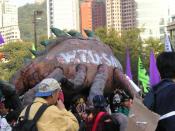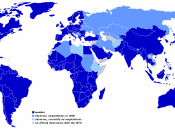The WTO is the only international agency overseeing the rules of international trade. Its purpose is to help "trade flow smoothly, in a system based on rules, to settle trade disputes between governments, and to organise trade negotiations" (Carleton, n.d, 3)
In 1998, the WTO sparked quite a controversy among the environmental groups. The WTO ruled that the "United States was wrong to prohibit shrimp imports from countries that failed to protect seat turtles from entrapment in the nets of shrimp boats" (Hill, 2001, p187), even though sea turtles was considered to be endangered. As Weinstein and Charnovitz (2001) suggests that although the WTO is often depicted to be anti-environmentalist, this reputation is largely undeserved and misunderstood. A careful look at the WTO's record shows that the organisation is in fact "developing constructive principles for accommodating both trade and environmental concerns" (Weinstein and Charnovitz, 2001, p1). Explained by Friedrich von Kirchbach in an interview, the WTO takes measures to protect the health and safety of "wildlife, plants, animals and humans as well as environment, generally all of which are possible under WTO rules" (Kirchbach, 2001, p1).
Due to the fishing debate, a large misconception was that the WTO is undemocratic and only serves interest of multinational corporations. Decisions in the WTO are generally by consensus. In principle, that is even more democratic than majority rule as everyone has to agree. In order to be non-discriminative between countries, the WTO adopts a "most favoured nation treatment" (WTO, 2003, 1). Equal treatment is an overwhelmingly important and useful principle for both fairness and efficiency.
It is still debatable whether the WTO can be seen as a positive externality to the world economy. As suggested by Weinstein and Charnovitz (2001), the organisation needs to figure out how to manage...



Report on WTO
For being so short, it describes the cituation well. But you should have, for those out there that don't know what "WTO" stands for, written what the abbreviation is. Well-done essay overall.
1 out of 1 people found this comment useful.